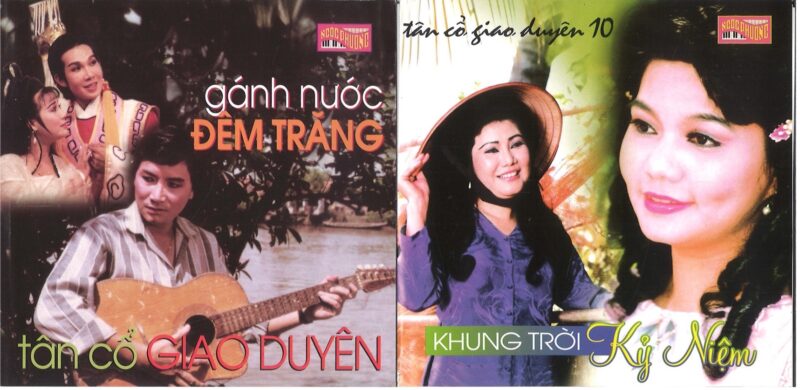
My sister once shared an anecdote about how our parents would disallow her and our brother from watching any cartoons or wuxia TVB series during school nights and would instead pop in a cải lương or tân cổ VHS tapes for them to watch and be culturally acquainted with. My sister still resents that part of her childhood because she can’t force herself to enjoy melodramatic operatic singing. Now she opts out of relistening to any cải lương or tân cổ and recedes into a corner of her room, listening to Cantopop to drown out the dramatic and impassioned songs that our mother enjoys listening to and watching as a possible passive retaliation for policing a fraction of her childhood.
There are times when I’m in the living room, gleefully consuming gratuitously violent yet well-choregraphed martial arts wuxia films seen in classic, non-CGI Shaw Brother films, and can hear the discernible lyrics my brother used to karaoke along to, mostly because Má turns the volume up to the max; and then my sister remains in her room, listening to Cantopop and creating a collision of sounds, lyrics, and languages as she attempts to subdue any diasporic songs that she was forced to listen to. Cantonese wuxia theme songs were also a part of my sister’s childhood in the 80s, but the melodic composition and beatific singing she can’t understand has a poetic nostalgia she keeps returning to.
During the pandemic, especially since lockdown, my sister and I have been rewatching several TVB and ATV wuxia phim bộ from Hong Kong’s golden eras of flowy garish costume dramas with mediocre and excitingly fast-paced martial arts battle scenes. Reliving a childhood that’s momentarily absent in current preserved memories during the transitions between teenage years and adulthood only to return because the allures of a disappearing past and eras that are disappearing and receding out of cultural memory are strong and all firmly rooted in the consumption of history and nostalgia. And in these moments of rewatching wuxia series, my sister would peruse YouTube to listen to the Cantonese theme songs while I search for any existing Cantopop songs translated into Vietnamese to listen to, one being TVB’s 1974 adaption of Jin Yong’s (Louis Cha) novel, Tiếu Ngạo Giang Hồ (Smiling Proud Wanderer) starring Chow Yun-fat, a duet by the late Ngọc Lan and Vũ Khanh. The original duet was recorded and performed by Frances Yip and Johnny Ip, which had this definitive wuxia sound, even if I can’t understand Cantonese; the musical composition complemented by their strong vocals carry this palpable wuxia feel scene on the screen. Yet, the Vietnamese rendition of the song, “Trọn Kiếp Yêu Người,” sounds like a typical but beautifully sung ballad with generic sounding lyrics.
There’s a beauty, though perhaps oxymoronic, in not understanding a language but appreciating a song’s composition. Several people describe music with borders // âm nhạc không biên giới; but which music freely enters and which ones get excluded and remains in the borders only to be unheard?
Aside from relistening to my parents’ repeated retellings of their experiences, I also relistened to multiple Vietnamese songs that are resonant and entangled with each other, as if the stories lyrically told in the verses are elongated musical intonations that riff off the other, creating a synchronized momentum that plays in unrestrained continuation. Some of these retellings are part of my family history, many that I’ve referenced and framed in my own writing, something that my mother likes to point out, which is why I’ll always include her in my acknowledgements. But like many repetitions over time, they, too, can be overwhelming to the point of auditory exhaustion.
I think I have a love/hate relationship with Vietnamese music. I don’t actively choose to listen to nhạc Việt Nam. The constant replaying of re-recorded Vietnamese music is difficult. Same verve, same retelling, same notes, same movements, same pulsating tempo, and same cadences; Vietnamese music can be described as homogenized largely due to how the expansive genre is while maintaining its unforgotten historical longevity and unbroken, definitive, familiar rhythms that singers and composers have yet to diverge from. Vietnamese music hasn’t changed much nor has it evolved from its own singular familiarity. And perhaps these continual relistenings and replayings present how Vietnamese musical motifs and refrains are framed as loose, dissonant parallels of my complicated relationship with my parents’ identities as former South Vietnamese citizens, their past allegiance that waver/ed in the present, and their strong sense of nationalism. Diasporic sounds remain in this stagnancy that repeats; composers, listeners, and singers alike do not examine their own complicity or insular nationalism.
I write about my parents’ memories, but I’ve aged into a sense of ambivalence of truly embracing my parents’ memories, sometimes histories, because theirs are nationalistic heavy, particularly my father’s since his memories are firmly rooted in the war, one that he seemingly couldn’t move on from when he was alive.



I appreciate your post, but I feel like there is so much generalization about Vietnamese music and its history. Try to appreciate the diversity of Vietnamese diasporic music, it’s definitely not “same,” nor is it all “nostalgic” or “nationalistic.” I think you there comes a point where one is so good at analyzing Vietnamese people academically that you end up guessing their thoughts and feelings and take away their agency.
Lynda Trang Dai is not a Trump supporter due to her loyalty to a past she didn’t live through. And Vietnamese refugee people have had a variety of different forms of music about love, loss, fun, and partying like every culture. Generalizing their music as same is akin to saying all rap music is just swearing about drugs and all pop music about breakups and sex.